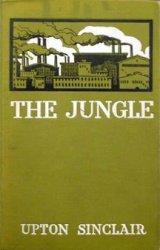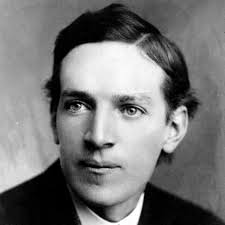The Jungle Page #23
The Jungle is a 1906 novel by the American journalist and novelist Upton Sinclair. Sinclair wrote the novel to portray the harsh conditions and exploited lives of immigrants in the United States in Chicago and similar industrialized cities.
Grandmother Majauszkiene saw that her friends were puzzled at this remark; they did not quite see how paying for the house was “fooling the company.” Evidently they were very inexperienced. Cheap as the houses were, they were sold with the idea that the people who bought them would not be able to pay for them. When they failed--if it were only by a single month--they would lose the house and all that they had paid on it, and then the company would sell it over again. And did they often get a chance to do that? Dieve! (Grandmother Majauszkiene raised her hands.) They did it--how often no one could say, but certainly more than half of the time. They might ask any one who knew anything at all about Packingtown as to that; she had been living here ever since this house was built, and she could tell them all about it. And had it ever been sold before? Susimilkie! Why, since it had been built, no less than four families that their informant could name had tried to buy it and failed. She would tell them a little about it. The first family had been Germans. The families had all been of different nationalities--there had been a representative of several races that had displaced each other in the stockyards. Grandmother Majauszkiene had come to America with her son at a time when so far as she knew there was only one other Lithuanian family in the district; the workers had all been Germans then--skilled cattle butchers that the packers had brought from abroad to start the business. Afterward, as cheaper labor had come, these Germans had moved away. The next were the Irish--there had been six or eight years when Packingtown had been a regular Irish city. There were a few colonies of them still here, enough to run all the unions and the police force and get all the graft; but most of those who were working in the packing houses had gone away at the next drop in wages--after the big strike. The Bohemians had come then, and after them the Poles. People said that old man Durham himself was responsible for these immigrations; he had sworn that he would fix the people of Packingtown so that they would never again call a strike on him, and so he had sent his agents into every city and village in Europe to spread the tale of the chances of work and high wages at the stockyards. The people had come in hordes; and old Durham had squeezed them tighter and tighter, speeding them up and grinding them to pieces and sending for new ones. The Poles, who had come by tens of thousands, had been driven to the wall by the Lithuanians, and now the Lithuanians were giving way to the Slovaks. Who there was poorer and more miserable than the Slovaks, Grandmother Majauszkiene had no idea, but the packers would find them, never fear. It was easy to bring them, for wages were really much higher, and it was only when it was too late that the poor people found out that everything else was higher too. They were like rats in a trap, that was the truth; and more of them were piling in every day. By and by they would have their revenge, though, for the thing was getting beyond human endurance, and the people would rise and murder the packers. Grandmother Majauszkiene was a socialist, or some such strange thing; another son of hers was working in the mines of Siberia, and the old lady herself had made speeches in her time--which made her seem all the more terrible to her present auditors. They called her back to the story of the house. The German family had been a good sort. To be sure there had been a great many of them, which was a common failing in Packingtown; but they had worked hard, and the father had been a steady man, and they had a good deal more than half paid for the house. But he had been killed in an elevator accident in Durham's. Then there had come the Irish, and there had been lots of them, too; the husband drank and beat the children--the neighbors could hear them shrieking any night. They were behind with their rent all the time, but the company was good to them; there was some politics back of that, Grandmother Majauszkiene could not say just what, but the Laffertys had belonged to the “War Whoop League,” which was a sort of political club of all the thugs and rowdies in the district; and if you belonged to that, you could never be arrested for anything. Once upon a time old Lafferty had been caught with a gang that had stolen cows from several of the poor people of the neighborhood and butchered them in an old shanty back of the yards and sold them. He had been in jail only three days for it, and had come out laughing, and had not even lost his place in the packing house. He had gone all to ruin with the drink, however, and lost his power; one of his sons, who was a good man, had kept him and the family up for a year or two, but then he had got sick with consumption. That was another thing, Grandmother Majauszkiene interrupted herself--this house was unlucky. Every family that lived in it, some one was sure to get consumption. Nobody could tell why that was; there must be something about the house, or the way it was built--some folks said it was because the building had been begun in the dark of the moon. There were dozens of houses that way in Packingtown. Sometimes there would be a particular room that you could point out--if anybody slept in that room he was just as good as dead. With this house it had been the Irish first; and then a Bohemian family had lost a child of it--though, to be sure, that was uncertain, since it was hard to tell what was the matter with children who worked in the yards. In those days there had been no law about the age of children--the packers had worked all but the babies. At this remark the family looked puzzled, and Grandmother Majauszkiene again had to make an explanation--that it was against the law for children to work before they were sixteen. What was the sense of that? they asked. They had been thinking of letting little Stanislovas go to work. Well, there was no need to worry, Grandmother Majauszkiene said--the law made no difference except that it forced people to lie about the ages of their children. One would like to know what the lawmakers expected them to do; there were families that had no possible means of support except the children, and the law provided them no other way of getting a living. Very often a man could get no work in Packingtown for months, while a child could go and get a place easily; there was always some new machine, by which the packers could get as much work out of a child as they had been able to get out of a man, and for a third of the pay.
Translation
Translate and read this book in other languages:
Select another language:
- - Select -
- 简体中文 (Chinese - Simplified)
- 繁體中文 (Chinese - Traditional)
- Español (Spanish)
- Esperanto (Esperanto)
- 日本語 (Japanese)
- Português (Portuguese)
- Deutsch (German)
- العربية (Arabic)
- Français (French)
- Русский (Russian)
- ಕನ್ನಡ (Kannada)
- 한국어 (Korean)
- עברית (Hebrew)
- Gaeilge (Irish)
- Українська (Ukrainian)
- اردو (Urdu)
- Magyar (Hungarian)
- मानक हिन्दी (Hindi)
- Indonesia (Indonesian)
- Italiano (Italian)
- தமிழ் (Tamil)
- Türkçe (Turkish)
- తెలుగు (Telugu)
- ภาษาไทย (Thai)
- Tiếng Việt (Vietnamese)
- Čeština (Czech)
- Polski (Polish)
- Bahasa Indonesia (Indonesian)
- Românește (Romanian)
- Nederlands (Dutch)
- Ελληνικά (Greek)
- Latinum (Latin)
- Svenska (Swedish)
- Dansk (Danish)
- Suomi (Finnish)
- فارسی (Persian)
- ייִדיש (Yiddish)
- հայերեն (Armenian)
- Norsk (Norwegian)
- English (English)
Citation
Use the citation below to add this book to your bibliography:
Style:MLAChicagoAPA
"The Jungle Books." Literature.com. STANDS4 LLC, 2025. Web. 10 Mar. 2025. <https://www.literature.com/book/the_jungle_272>.








Discuss this The Jungle book with the community:
Report Comment
We're doing our best to make sure our content is useful, accurate and safe.
If by any chance you spot an inappropriate comment while navigating through our website please use this form to let us know, and we'll take care of it shortly.
Attachment
You need to be logged in to favorite.
Log In